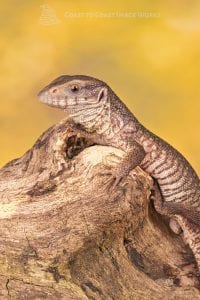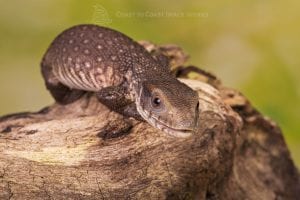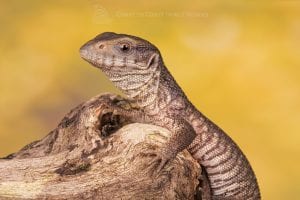 Bosc monitors (sometimes referred to as Savannah monitors in US literature) are a largish lizard native to Africa. Over the years they have been a popular choice as pets, but it’s perhaps best to describe this species as needing more advanced care than many pet keepers can offer. Please give careful consideration to their needs, they require a large vivarium once adult, larger than most keepers can provide in the average home. As with
Bosc monitors (sometimes referred to as Savannah monitors in US literature) are a largish lizard native to Africa. Over the years they have been a popular choice as pets, but it’s perhaps best to describe this species as needing more advanced care than many pet keepers can offer. Please give careful consideration to their needs, they require a large vivarium once adult, larger than most keepers can provide in the average home. As with  many monitor species they can be quite destructive too, so enclosures must be stoutly built and its important to ensure (for the safety of animal and keeper) that all heaters, lights and any other electrical equipment and cables are well fastened, secure and guarded (fire risk).
many monitor species they can be quite destructive too, so enclosures must be stoutly built and its important to ensure (for the safety of animal and keeper) that all heaters, lights and any other electrical equipment and cables are well fastened, secure and guarded (fire risk).
For a baby Bosc a three to four feet vivarium would be ideal, for an adult a truly enormous vivarium would be required – maybe more accurately described as a small room. Without the ability to move around adequately and exercise this species is prone to obesity – most adult Boscs in pet ownership suffer with this and the resulting  ailments. They require a basking temperature of around 32C, and this can be provided by various means (which are fearlessly argued about within the hobby) – but one thing that is agreed by all it needs to be overhead, so the animal can bask – don’t use underfloor heating. We personally would use a ceramic heater (or more than one, or perhaps a mixture of other heaters for a large vivarium), other choices include halogen and incandescent bulbs. Lighting is important, we suggest a good quality T5 12{cb5d0a8cf0c44aef2db327d9ab0dba08dd09aed1126b509e5fa01d3aaa87fe47} light tube such as Reptile Systems or Zoo Med.
ailments. They require a basking temperature of around 32C, and this can be provided by various means (which are fearlessly argued about within the hobby) – but one thing that is agreed by all it needs to be overhead, so the animal can bask – don’t use underfloor heating. We personally would use a ceramic heater (or more than one, or perhaps a mixture of other heaters for a large vivarium), other choices include halogen and incandescent bulbs. Lighting is important, we suggest a good quality T5 12{cb5d0a8cf0c44aef2db327d9ab0dba08dd09aed1126b509e5fa01d3aaa87fe47} light tube such as Reptile Systems or Zoo Med.
Most Boscs have a huge appetite, combine this with a too small an enclosure and it’s a recipe for health disaster. Youngsters eat a variety of insects and generally will eat all available commercial livefood such as cockroaches, locusts, crickets etc. The adult diet is a little more tricky, many keepers provide entirely a defrosted rodent diet. In the wild they mainly eat insects and the like as an adult, and due to the foraging, they are well exercised too. For this reason an entire rodent diet will account for the obesity, maybe feed them this as a once in a while treat, but not often. Provide gut-loading for the insects (correct diet for them) and this will balance the diet better for the monitor – there are commercial diets available.
little more tricky, many keepers provide entirely a defrosted rodent diet. In the wild they mainly eat insects and the like as an adult, and due to the foraging, they are well exercised too. For this reason an entire rodent diet will account for the obesity, maybe feed them this as a once in a while treat, but not often. Provide gut-loading for the insects (correct diet for them) and this will balance the diet better for the monitor – there are commercial diets available.
